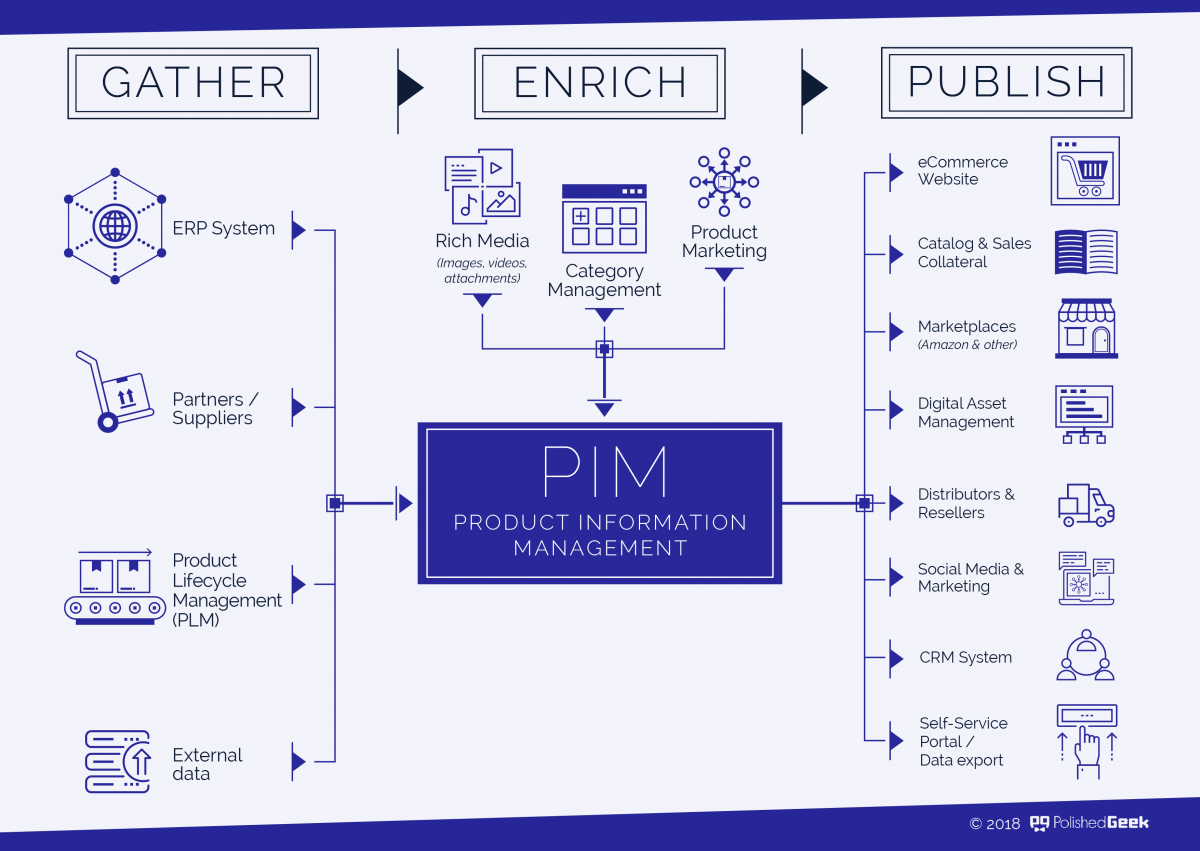B2C or B2B, in Ecommerce one golden rule applies: whoever offers the best Buyers Experience, will have an advantage over their competitors. This is a combination of several factors. The speed of your platform is very important, as is its performance on mobile devices. The findability and quality of navigation are also of great influence. And, last but not least, the completeness and quality of the product data. That's why Product Information Management in B2B - or rather Product Information & Materdata Management - is perhaps even more important than in B2C.
Consumers look at webshops because they are looking for something. Effective search functions bring them to specific products and recommendations. Subsequently, it is the quality of the product information that helps the consumer on his way to the checkout. The more convincing the coherence in visuals, product descriptions and reviews, the greater the chance of a successful transaction. Moreover, complete and adequate product information reduces the risk of disappointment and returns. A win-win situation, therefore.
Quality of product data is crucial to the quality of the B2B Customer Experience'.
In B2B, the process is no different. Business buyers are on your platform because they are looking for a specific product or part of a product. The only difference is that players in the B2B industry generally have somewhat fewer competitors than online retailers. But the principle of the Buyers Journey is the same. An effective navigation system, tailored to the business and the product range, leads the customer to one or more products in the shortest possible time. Here too, the quality of the product information is decisive for the success and speed of the transaction. B2B Ecommerce is aimed at ensuring that buyers do not have to call back to retrieve product specifications. What you see is what you get.
The importance of Product Information Management in B2B is widely recognised'.
That's why Product Information Management in B2B is essential. But what for Ecommerce retailers has long been part of policy, is only just starting for many manufacturers, wholesalers and distributors. The smaller players in particular are still struggling with the question of how they can continue to manage complicated information flows and efficiently translate detailed data into coherent and consistent product presentations for the business market. Hence, the interest from the B2B industry in advanced Product Information and Master Data Management Systems (PIMM) is increasing. In 2019, the global PIMM market was still valued at US $ 9.9 billion, for 2027 it is estimated to be close to US $ 60 billion. That spectacular growth is partly due to the catch-up of B2B Ecommerce.
The fact that B2B lags behind retail is perfectly understandable. Manufacturing companies and wholesalers have traditionally dealt with their markets and customers differently. The main role in sharing the often complicated product information was played by salespeople and representatives who visited customers in person, armed with fistfuls of catalogues. The path to online sales activities - a path that was significantly accelerated by COVID-19 last year - requires a completely new customer approach. Customers are not helped by the possibility of downloading a catalogue and then having to find out for themselves. B2B customers are consumers too and they expect a similar Customer Experience as when they shop online in private.
Just like private online shoppers, B2B relations want to be able to filter and compare products and specifications and make decisions quickly. In contrast to B2C, emotional values do not play a role here, but the purchasing process is based purely on commercial, verifiable facts. This places extra demands on Product Information Management in B2B. Everything must be correct; the customer must be able to see at a glance whether specifications match his requirements. Furthermore, repeat purchases of (almost) identical products are more common in B2B. Here too, the product data technology offered must be geared towards optimum convenience and maximum efficiency.
The new representative in B2B is now called PIMM'.
Whereas the Customer Experience for consumers is a mix of convenience, emotion and brand loyalty, the quality of the B2B Customer Journey is primarily determined by speed, completeness, efficiency and trust. Buyers must be able to rely one hundred per cent on the product data provided being correct down to the last detail. After all, the products or components to be purchased are often crucial to the continuity of business processes or to end-user satisfaction. In short: Product Information Management in B2B takes over the role of the trusted representative who knew all the specifications by heart and is therefore decisive for the bond with the customer.
The more products, product variants and components, the more complicated it is to enrich product data. Think also of type numbers and specific technical codes. B2B Ecommerce also breaks down barriers. Wholesalers who used to have a primarily regional function are now seeing opportunities to go national and even international, thanks to Ecommerce techniques. This means that product information is offered in multiple languages and is tailored per country or continent to the rules and standards applicable there.
'More efficiency, more revenue, more bonding - compare the global PIM offering'
As mentioned, the corona pandemic puts the need to go online as a B2B industry into high gear. This comes at a time when the trend towards B2B Ecommerce has been irreversible for some time. The market is growing and growing, with a annual rate of 17.5% between now and 2027, according to research results from the US. Manufacturers, wholesalers and distributors alike are increasingly looking to their customers online and deploying powerful B2B platforms to do so.
In this often complicated product environment, the integration of smart, powerful and future-proof PIMM software (Product Information & Master Data Management) is crucial. There's no getting around it: Product Information Management in B2B is a core condition for an efficient, businesslike Customer Journey that results in more turnover and loyalty. Compare it to global offering of PIMM software.














